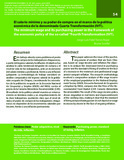Mostrar el registro sencillo del ítem
El salario mínimo y su poder de compra en el marco de la política económica de la denominada Cuarta Transformación (IVT)
| dc.rights.license | http://creativecommons.org/licenses/by-nc-sa/3.0/ve/ | es_VE |
| dc.contributor.author | Torres Rojas, Jorge Luis Fidel | |
| dc.contributor.author | Sovilla, Bruno | |
| dc.date.accessioned | 2025-04-10T12:42:23Z | |
| dc.date.available | 2025-04-10T12:42:23Z | |
| dc.date.issued | 2025-04-10 | |
| dc.identifier.issn | 0798-3069 | |
| dc.identifier.uri | http://www.saber.ula.ve/handle/123456789/51573 | |
| dc.description.abstract | Este trabajo aborda como problema el poder de compra de los trabajadores chiapanecos, a partir del ingreso salarial y la inflación. El objetivo fue analizar la caída tendencial del poder de compra y el nivel de vida de los trabajadores, ante un incremento del salario mínimo y profesional, frente a una inflación galopante. La metodología de trabajo consideró un análisis comparativo del ingreso salarial de la población ocupada de Chiapas, considerando los microdatos de la población ocupada en la Encuesta Nacional de Ocupación y Empleo (ENOE) del INEGI, contra el precio de la Canasta Alimenticia Recomendable (CAR). El resultado de la política salarial muestra un estancamiento en términos reales y un empobrecimiento de la clase trabajadora, quedando claro que el nivel de vida y el poder de compra de los trabajadores chiapanecos no dependen de los incrementos salariales por decreto, frente a una inflación permanente. | es_VE |
| dc.language.iso | es | es_VE |
| dc.publisher | SaberULA | es_VE |
| dc.rights | info:eu-repo/semantics/openAccess | es_VE |
| dc.subject | Poder adquisitivo | es_VE |
| dc.subject | Nivel de vida | es_VE |
| dc.subject | Inflación | es_VE |
| dc.title | El salario mínimo y su poder de compra en el marco de la política económica de la denominada Cuarta Transformación (IVT) | es_VE |
| dc.title.alternative | The minimum wage and its purchasing power in the framework of the economic policy of the so-called “Fourth Transformation" (IVT) | es_VE |
| dc.type | info:eu-repo/semantics/article | es_VE |
| dc.description.abstract1 | This paper adresses the issue of the purchasing power of workers that are from Chiapas, based on wage income and inflation.The objective is to analyze the downward trend in purchasing power and the standard of living of workers in the face of a increase in the minimum and professional wage amidst rampant inflation. The research methodology involved a comparative analysis of the wage income of the employed population in the National Employment Survey (ENOE: Encuesta Nacional de Ocupación y Empleo) by INEGI, compare don the Price of the Recommended Food Basket (CAR: Canasta Alimenticia Recomendable).The result of the wage income policy shows stagnation in real terms and improverishment of the working class, making it clear that the standard of living and purchasing power do not depend on wage increases by decree in the face of ongoing inflation. | es_VE |
| dc.description.colacion | 54-69 | es_VE |
| dc.description.email | revistafermentum@gmail.com | es_VE |
| dc.description.email | fidel@unach.mx | es_VE |
| dc.description.email | bruno.sovilla@unach.mx | es_VE |
| dc.description.frecuencia | Cuatrimestral | |
| dc.description.paginaweb | www.saber.ula.ve/fermentum | |
| dc.identifier.depositolegal | pp1991102ME302 | |
| dc.publisher.pais | Venezuela | es_VE |
| dc.subject.institucion | Universidad de Los Andes | es_VE |
| dc.subject.keywords | Purchasing power | es_VE |
| dc.subject.keywords | Standard of living | es_VE |
| dc.subject.keywords | Inflation | es_VE |
| dc.subject.seccion | Revista Fermentum: Artículos | es_VE |
| dc.subject.tipo | Artículos | es_VE |
| dc.type.media | Texto | es_VE |
| dc.contributor.orcid | https://orcid.org/0000-0002-5664-2147 |
Ficheros en el ítem
Este ítem aparece en la(s) siguiente(s) colección(ones)
-
Fermentum - Año 035 - Nº 102
enero-abril 2025


